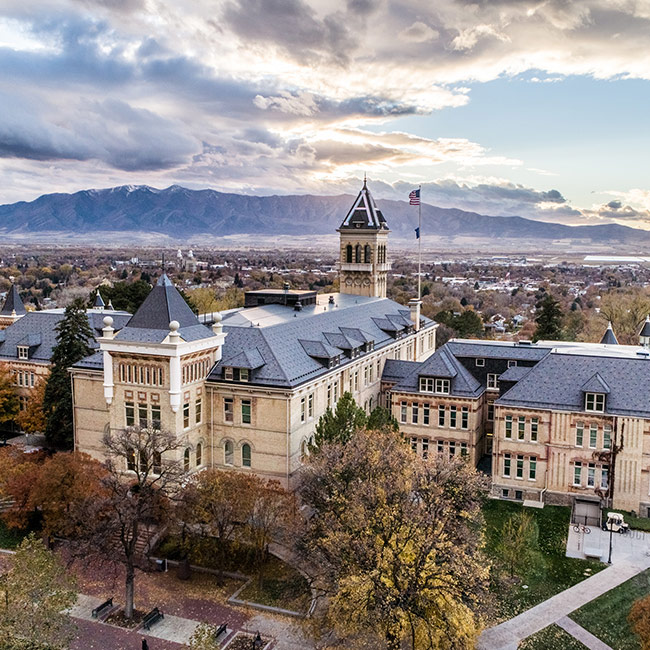About This Degree
USU is the only university in the state with a college devoted to the study of natural resources, and the degree in wildlife biology is one of the few academic programs in the nation where students can study the management of human-wildlife conflict.
Professors in the department have a wide array of interest areas in wildlife biology that students can study and are renowned for securing research grants and publishing their research. The department promotes a particular focus on current issues and concerns in natural resources, such as climate change, endangered species, restoration of sagebrush steppe systems and other landscapes, and human-wildlife conflict.
Utah State is at the nexus of the Intermountain West. With field study opportunities in diverse habitat zones, students have the unique opportunity to work in various landscapes. This geographic situation attracts high-caliber scientists as faculty at USU, allowing students to work with recognized experts in their fields. Students are supported in their research and encouraged to participate at conferences, and the travel expenses and costs to participate are often provided by the department.
Additionally, graduates in wildlife biology have an excellent track record for career placement.
ADVISING
At a Glance
College: S.J. & Jessie E. Quinney College of Natural Resources
Department: Wildland Resources Department
USU Locations:
- Logan campus
Faculty: View profiles of faculty members on the department directory.
Program Requirements
Career And Outcomes
Career Opportunities
Graduates in wildlife biology are able to work in the following careers:
- Researchers for government agencies
- University faculty and academia (with the PhD)
- Environmental consultants
- Extension specialists
- Research biologists
- Conservationists
- Wildlife managers
- Administrators in wildlife services
- Non-government organizations
Job Outlook
USU Locations

LOGAN CAMPUS
Admission
Admission Requirements
Students with undergraduate degrees in natural resources or sciences are preferred.
To be accepted to the program, it is recommended that applicants first contact a specific faculty member with whom they are interested in working. If the faculty member is accepting graduate students and agrees to work with the student, the student can then apply by completing the following application requirements:
Application Requirements:
- Complete the online application
- Pay the $55 application fee
- The GRE is not required by the Department or College, but that specific advisors may require GRE scores
- Have a 3.0 or higher GPA on your last 60 semester or 90 quarter credits
- Provide transcripts of all college/university credits
- Provide three contacts for letters of recommendation
International students have additional admissions requirements.
Deadlines
Applications for graduate programs are accepted year-round. However, chances for acceptance are best if students apply between October and January of each academic year. It is also encouraged that students begin in the fall if possible.
Program Requirements
PhD Qualifying Exams:
PhD students must pass comprehensive examinations. This exam is used to assess whether a student is prepared to successfully conduct independent research. The assessment depends upon the student’s knowledge in his or her area of emphasis and in supporting areas, understanding of philosophical perspectives on scholarship, and ability to communicate this knowledge effectively.
It is recommended that the comprehensive exam be taken by the end of the student’s second academic year, and it must be passed no later than one year prior to defending the dissertation and before candidacy will be recommended.
Plan Options
Students can receive the MS by pursuing one of two options:
- In the Plan A option, students complete graduate-level coursework and must write a thesis.
- The Plan B option requires the production of a paper or creative work of art and is expected to reflect equivalent scholarship standards as a thesis.
Financial Aid
The Department of Wildland Resources provides funding for most of its graduate students through research assistantships, available through professors having contracts, grants, or other awards.
A variety of funding opportunities are available on the graduate school website.
Take The Next Step
How to Apply
View our step-by-step guide on how to become an Aggie.
Request Information
Contact the School of Graduate Studies to ask questions or receive more information.
Cost and Funding
Calculate the cost of graduate school and learn about funding opportunities.
You May Also Be Interested In

Biology
Conduct graduate research in a selective program where you can study a variety of areas in biology, including ecology, evolution, microbiology, virology, animal behavior, and more.

Ecology
Work on exciting research projects with renowned faculty studying ecology through the lens of a variety of different scientific disciplines.

Master of Natural Resources
Earn a master’s as a working professional as you take courses to help you become a manager and decision maker in the natural resources field.

Range Science
Get a unique advanced degree in range science as you study the science and application of ecology principles in rangeland environments.

